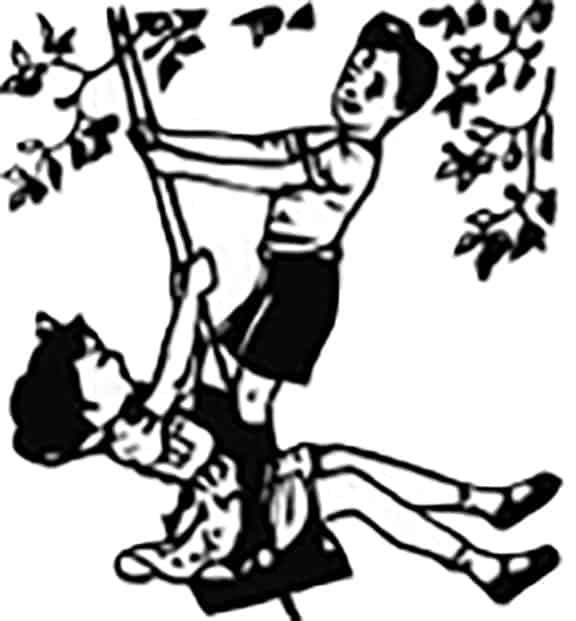
Mr. Tim Vetter, Assistant Principal at Summit Academy, usually ends his longer than average school days with a leisurely stroll through Coffey Park. “It gives me time to reflect and unwind. Some days can be tough. So, naturally, I gravitate towards the swings.”
Mr. Vetter was clear that he would never make children wait their turn, and often gives up his swing. But in the case of another adult, he practices the art of “first come, first serve,” as he likes to call it.
So, on Monday, March 27, Mr. Vetter was enjoying his early evening swinging therapy when he was approached by Ms. Hadley Ruggles. She was also reeling from an exhausting, “but always rewarding” day as Head of School at BASIS Independent. She too required a swinging moment.
However, every other available swing was unavailable. She watched the stress and tension seep out of Mr. Vetter for a few minutes. When she had decided that his turn was over, Ms. Ruggles announced to the assistant principle that his turn was over.
Mr. Vetter was in utter disbelief because he simply did not believe he was quite finished. Not wanting to make a scene, he simply ignored the rash woman and carried on about his swinging business.
Annoyed by his pompousness, Ms. Ruggles shouted out again. “Aren’t you quite finished yet, Mister?” She asserted one hand on her hip, and stomped her other foot for good measure.
Mr. Vetter realized the seriousness of her tone. He determined that she was not to be taken for granted. A confrontation would surely ensue. “Madam, I am not quite finished, if you please, so I respectfully request that you go on your not-so-merry way!”
Ms. Ruggles, nearly always so-very-merry, was so taken aback that her hand fell from her hip. She really wanted to swing this particular day because so often there just wasn’t time. Today, she would not be swayed. She walked up to Mr. Vetter and gave him a swift push on the back in an attempt to dismount him from the swing.
To her horror, Mr. Vetter giggled with delight because he merely soared higher in the air. But as he back-swung, his feet scraped the ground, lost his balance, and toppled off his perch.
Ms. Ruggles did not miss a beat as she swooped in and stole his seat. And before the assistant principal could get from beneath her feet, she had already begun her swinging ascent into the sky.
Students and other playmates grew increasingly uncomfortable. In fact, three other swings had opened up. But the grownups didn’t care. “I was here first. It isn’t fair! That’s my swing!” Mr. Vetter screamed.
“You need to learn how to share,” Ms. Ruggles quipped back. “It’s my turn now! Nanny nanny boo boo!”
“But there’s all these other swings,” he cried to no one in particular. “Why did you have to take my swing?” A fierce determination sprang onto his face. He reached out and grabbed one of the swing’s chains, which caused Ms. Ruggles to jerk wildly from side to side. She was so disoriented that she put her feet on the ground and stood up, giving Mr. Vetter the opportunity to seize her swing. But only one side.
Mr. Vetter had hold of the left chain, while Ms. Ruggles desperately clung on to the right chain. Both school heads looked exasperated.
“Well, what should we do now?” Ms. Ruggles asked.
“Maybe we should both just walk away,” Mr. Vetter answered.
“That wouldn’t solve anything,” she replied.
“You’re right; there’s only one swing and two of us,” he said.
“Actually, you’re wrong. There are lots of swings,” she said. “But I want this one. Just so that you can’t have it.”
“Then we’ll just have to fight for it.”
According to witnesses, the two then went scouring the playground for potential weapons. Mr. Vetter returned with a muddy stick. Ms. Ruggles brought a less muddy stick. And the duel was on.
At this point, local authorities arrived, but did not intervene. An officer from the 76th precinct was overheard saying, “I want to see who will win the Battle of the Branch!”
The two began the match with fancy footwork that exhibited an impressive display of fencing skills. Branch-on-branch combat quickly ensued. The school dignitaries proved to be excellently matched until Mr. Vetter dealt the final blow, breaking Ms. Ruggles branch in two.
Officers quickly swooped in, picked up the broken branch and separated the educators.
Two days later, Mr. Vetter returned to his swing in Coffey Park to find “Ms. R wuz here” scratched into the seat of his swing.









